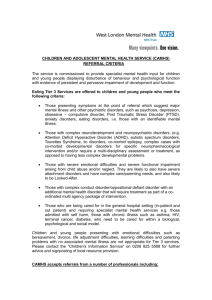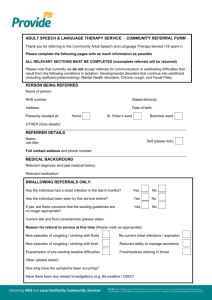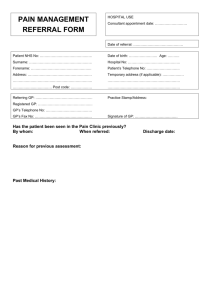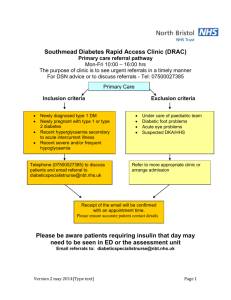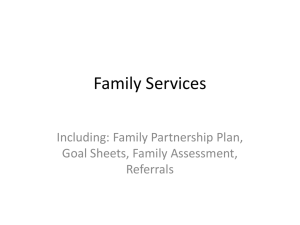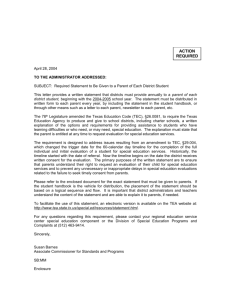the CAMHS referral criteria
advertisement
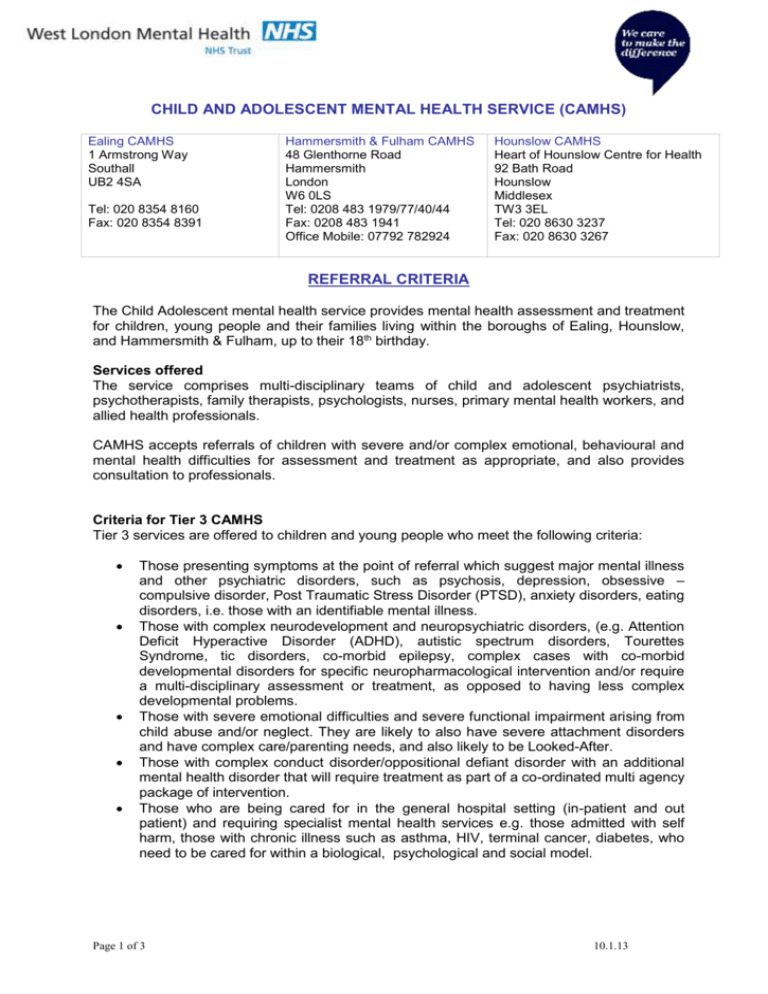
CHILD AND ADOLESCENT MENTAL HEALTH SERVICE (CAMHS) Ealing CAMHS 1 Armstrong Way Southall UB2 4SA Tel: 020 8354 8160 Fax: 020 8354 8391 Hammersmith & Fulham CAMHS 48 Glenthorne Road Hammersmith London W6 0LS Tel: 0208 483 1979/77/40/44 Fax: 0208 483 1941 Office Mobile: 07792 782924 Hounslow CAMHS Heart of Hounslow Centre for Health 92 Bath Road Hounslow Middlesex TW3 3EL Tel: 020 8630 3237 Fax: 020 8630 3267 REFERRAL CRITERIA The Child Adolescent mental health service provides mental health assessment and treatment for children, young people and their families living within the boroughs of Ealing, Hounslow, and Hammersmith & Fulham, up to their 18th birthday. Services offered The service comprises multi-disciplinary teams of child and adolescent psychiatrists, psychotherapists, family therapists, psychologists, nurses, primary mental health workers, and allied health professionals. CAMHS accepts referrals of children with severe and/or complex emotional, behavioural and mental health difficulties for assessment and treatment as appropriate, and also provides consultation to professionals. Criteria for Tier 3 CAMHS Tier 3 services are offered to children and young people who meet the following criteria: Those presenting symptoms at the point of referral which suggest major mental illness and other psychiatric disorders, such as psychosis, depression, obsessive – compulsive disorder, Post Traumatic Stress Disorder (PTSD), anxiety disorders, eating disorders, i.e. those with an identifiable mental illness. Those with complex neurodevelopment and neuropsychiatric disorders, (e.g. Attention Deficit Hyperactive Disorder (ADHD), autistic spectrum disorders, Tourettes Syndrome, tic disorders, co-morbid epilepsy, complex cases with co-morbid developmental disorders for specific neuropharmacological intervention and/or require a multi-disciplinary assessment or treatment, as opposed to having less complex developmental problems. Those with severe emotional difficulties and severe functional impairment arising from child abuse and/or neglect. They are likely to also have severe attachment disorders and have complex care/parenting needs, and also likely to be Looked-After. Those with complex conduct disorder/oppositional defiant disorder with an additional mental health disorder that will require treatment as part of a co-ordinated multi agency package of intervention. Those who are being cared for in the general hospital setting (in-patient and out patient) and requiring specialist mental health services e.g. those admitted with self harm, those with chronic illness such as asthma, HIV, terminal cancer, diabetes, who need to be cared for within a biological, psychological and social model. Page 1 of 3 10.1.13 The following is a list of some of the problems that are not regarded as first line work of the specialist CAMHS team but would be considered when, despite the involvement of other professionals and agencies, specialist mental health input still appears to be indicated: Isolated anger outbursts Oppositional and/or defiant behaviour Feeding problems Sleep problems Difficulties presenting exclusively in a school setting Soiling and wetting Children and young people presenting with emotional difficulties such as bereavement, divorce, truancy, life adjustment difficulties, learning difficulties and parenting problems with no associated mental illness are not usually appropriate for Tier 3 services. In some cases, prior consultation with the duty worker may be useful to clarify whether a referral is appropriate. Alternative agencies may be recommended where necessary/possible. Source of referrals Referrals are accepted from a number of professionals, including: GPs Social workers Health professionals including paediatricians, school nurses and health visitors Adult mental health services Schools, via the Educational Psychologist, SENCO, or Behaviour Support Team Tier 2 multi-agency teams How to make a referral Referrals should be made in writing via the CAMHS referral form. These are available at request from the service or from the WLMHT website www.wlmht.nhs.uk. It is essential that the form is completed with as much detail as possible; and that the person with parental responsibility consents to the referral unless there are exceptional circumstances. A duty worker is available weekdays between 9.00am and 5.00pm to discuss potential referrals: Ealing 0208 354 8160 Hammersmith & Fulham 0208 483 1979 Hounslow 020 8630 3237 Consultation can be provided rather than direct assessment/intervention for cases where a mental health perspective will compliment work already in progress, or where there is professional anxiety or uncertainty whether referral to specialist CAMHS is appropriate. Processing of referrals All referrals will be screened for appropriateness and urgency, at which point factors such as severity, duration, complexity, likelihood of response to available treatments, and likelihood of engagement may be considered. Further information may be sought from a referrer or family if necessary. The categories below are then applied to determine clinical priority. Please note that these categories intended as a guide. The ability of the service to respond to non-urgent referrals may fluctuate depending on resources available. Page 2 of 3 10.1.13 Level 1 – Emergency – to be seen same day Please note that as a community based service we are unable to deal with acute emergency situations. Patients who are actively suicidal, exhibiting life threatening self-harming behaviour or are acutely psychotic are emergencies. In these cases, the child/young person should be referred directly to A&E for same day, urgent assessment. Staff are very willing to discuss with referrers whether or not cases should be considered as emergencies. Level 2 – Urgent assessment – to be seen within 5 working days Where there is concern about suicidal risk or where the young person presents with symptoms suggestive of significant psychiatric disorder, cases are considered for urgent assessment. In addition, consideration is given to the level of risk, distress, impairment, symptom severity and other contextual factors in determining priority. Significant psychiatric disorders which will require urgent assessment include: Symptoms suggestive of Psychosis Attempted or threatened suicide Symptoms of Anorexia nervosa with any of the following features: rapid or severe weight loss, very low calorie intake for more than 5 days, deliberate self harm Level 3 – priority assessment – to be seen within 4 weeks Where serious psychiatric, emotional or behavioural concerns exist and/ or delaying an assessment is likely to result in or contribute to significant deterioration, a referral will be prioritised for assessment e.g.: Moderate to severe depression Severe anxiety Severe or prolonged adjustment difficulties e.g. abnormal grief reactions or posttraumatic stress disorder Deliberate self-harm not deemed to be an emergency Obsessive compulsive disorder Level 4 – Routine – to be seen within 11 weeks We aim to see all accepted referrals within 11 weeks of referral in accordance with Department of Health guidance. Most are seen far sooner than this. Accepted referrals include persistent and moderate/severe difficulties related to: Attention/hyperactivity problems such as ADHD Autistic spectrum disorder (autism, Asperger’s Syndrome and other pervasive developmental disorders) Depression Anxiety Obsessive compulsive behaviour Post traumatic stress Difficulties with weight and eating Social and communication difficulties Tourette’s Syndrome School attendance difficulties where a clear mental health problem is likely Mental health difficulties associated with chronic physical illness Physical symptoms thought likely to arise from psychological causes Enduring and complex emotional and/or behavioural problems arising from family or environmental circumstances Page 3 of 3 10.1.13
